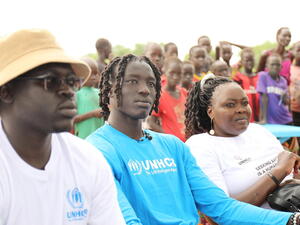Georgia: new internal displacement action plan; tensions in South Ossetia
Georgia: new internal displacement action plan; tensions in South Ossetia
UNHCR welcomes the adoption by the Government of Georgia of an Action Plan for Internally Displaced Persons, which reconfirms the country's commitment to address and mitigate the plight of tens of thousands of IDPs and improve their living conditions. The action plan includes a number of concrete government measures that address the housing situation as well as the access of IDPs to social services and education.
The adopted document, which is the result of months-long intensive consultations among different stakeholders, explicitly emphasizes that the international community has been invited to assist the government in addressing the needs and protecting the rights of IDPs by providing technical support, expertise, humanitarian assistance and funding.
UNHCR will be particularly active in the area of finding durable housing solutions for IDPs, through various initiatives. The number of displaced people in Georgia is estimated at 273,000. UNHCR has been present in the country since 1993.
In an unrelated development, over the last two days, nearly 1,100 people, many of them children under 16, arrived by bus from the breakaway region of South Ossetia in Georgia to North Ossetia-Alania in the Russian Federation. The movement followed clashes over the weekend, which included sniper and mortar fire, between South Ossetian and Georgian forces. At least six people are reported to have been killed, and 13 wounded, including two IDPs living in a collective centre. According to our office in Vladikavkaz, in North Ossetia, the recent arrivals are going there as a precautionary measure. No one is seeking asylum. They have said that they want to return home by the end of the summer. Some of the arrivals have been sheltered in public buildings such as summer camps and schools or in private accommodation with friends or relatives. UNHCR and other UN agencies are in contact with the authorities of the Russian Federation who are dealing with the situation.









